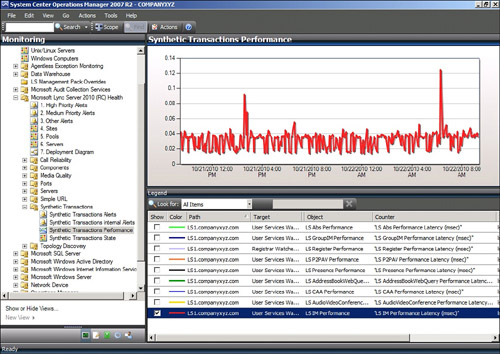- Title Page
- Copyright Page
- Dedication
- Contents at a Glance
- Table of Contents
- About the Authors
- Acknowledgments
- We Want to Hear from You!
- Reader Services
- Introduction
- Part I. Overview
- Chapter 1. What Is Microsoft Lync Server?
- Chapter 2. What Is New in Microsoft Lync Server?
- Introducing New Management Tools
- Topology Changes
- New Enterprise Voice Features
- New Call Management Features
- Integrated Mediation Server
- New Presence Features
- New Conferencing Features
- DNS Load Balancing
- Survivable Branch Appliances
- Operating System Support
- New Lync Client Features
- Client Appearance
- The “Me” Area
- Enhanced Contacts
- Privacy Relationships
- Integration with Office and Windows 7
- Whiteboarding and Application Sharing
- Improved Meeting Join Experience
- Conferencing Attendant and Scheduling
- PSTN Dial-In Conferencing Improvements
- Video Improvements
- Manager/Admin Improvements
- Improved Phone Experience
- Summary
- Chapter 3. Feature Overview of Microsoft Lync Server
- Chapter 4. Benefits of Microsoft Lync Server 2010
- Part II. Microsoft Lync Server 2010 Server Roles
- Chapter 5. Microsoft Lync Server 2010 Front End
- Chapter 6. Microsoft Lync Server 2010 Edge
- Chapter 7. Microsoft Lync Server 2010 Monitoring
- Overview
- Installation
- Configuration
- Administration
- Troubleshooting
- Best Practices
- Summary
- Chapter 9. Director
- Part III. External Dependencies
- Chapter 10. Dependent Services
- Chapter 11. SQL
- Chapter 12. Firewall and Security Requirements
- Part IV. Administration and Management
- Chapter 13. Monitoring Microsoft Lync Server 2010
- Overview
- OpsMgr Lync Server 2010 Monitoring
- What Is New in OpsMgr R2?
- How OpsMgr Works
- OpsMgr Architecture
- How to Use OpsMgr
- OpsMgr Component Requirements
- Advanced OpsMgr Concepts
- Understanding OpsMgr Deployment Scenarios
- Multiple Configuration Groups
- Deploying Geographic-Based Configuration Groups
- Deploying Political or Security-Based Configuration Groups
- Sizing the OpsMgr Database
- Defining Capacity Limits
- Defining System Redundancy
- Monitoring Nondomain Member Considerations
- Securing OpsMgr
- Installing Operations Manager 2007 R2
- Installing Edge Component Monitoring Certificates
- Installing the Lync Server 2010 Management Pack
- Best Practices
- Summary
- Chapter 14. Backup and Restore of Microsoft Lync Server 2010
- Chapter 15. Administration of Microsoft Lync Server 2010
- Chapter 13. Monitoring Microsoft Lync Server 2010
- Part V. Migrating from Older Versions
- Part VI. Voice
- Chapter 17. PBX Integration
- Chapter 18. Enterprise Voice
- Chapter 19. Audio Conferencing
- Part VII. Integration with Other Applications
- Chapter 20. Exchange 2010 and SharePoint 2010 Integration
- Overview
- Exchange 2010 Unified Messaging
- Call Answering Rules
- Exchange 2010 Unified Messaging Architecture
- Unified Messaging Users
- UM Web Services
- Supported IP/VoIP Hardware
- Unified Messaging Protocols
- Unified Messaging Installation
- Postinstall Configuration
- Data Storage in Unified Messaging
- Exchange 2010 Outlook Web Application
- SharePoint 2010 Integration
- Best Practices
- Chapter 21. UCMA
- Chapter 20. Exchange 2010 and SharePoint 2010 Integration
- Part VIII. Clients
- Chapter 22. Microsoft Communicator Client for Macintosh
- Chapter 23. Windows, Browser, and Silverlight Clients
- Chapter 24. UC Endpoints
- Part IX. Planning for Deployment
- Chapter 25. Virtualization
- Chapter 26. Planning for Internal Non-Voice Deployment
- Chapter 27. Planning for Deploying External Services
- Chapter 28. Planning for Voice Deployment
- Index
OpsMgr Functionality
,OpsMgr provides for several major pieces of functionality as follows:
• Management packs—Application-specific monitoring rules are provided within individual files called management packs. For example, Microsoft provides management packs for Windows server systems, Exchange Server, SQL Server, SharePoint, DNS, and DHCP, along with many other Microsoft technologies including Lync Server 2010. Management packs are loaded with the intelligence and information necessary to properly troubleshoot and identify problems. The rules are dynamically applied to agents based on a custom discovery process provided within the management pack. Only applicable rules are applied to each managed server.
• Event monitoring rules—Management pack rules can monitor for specific event log data. This is one of the key methods of responding to conditions within the environment.
• Performance monitoring rules—Management pack rules can monitor for specific performance counters. This data is used for alerting based on thresholds or archived for trending and capacity planning. The performance graph in Figure 13.1 shows IM Performance Latency data for the LS1 Server. There was a brief spike in latency at approximately 6:15 a.m., but the latency is normally under less than 0.05ms.
Figure 13.1 Operations Manager 2007 R2 Performance Charts

• State-based monitors—Management packs contain monitors, which allow for advanced state-based monitoring and aggregated health rollup of services. Monitors also provide self-tuning performance threshold monitoring based on a two- or three-state configuration. Figure 13.2 shows the health explorer for the LS1 Server. The Lync Server Application Sharing service is stopped.

Tip
The health explorer drills down to the states that are unhealthy, leaving all the other states collapsed for ease of troubleshooting.
Note
The health explorer in Figure 13.2 also shows the state change events over time. This enables reoccurring or intermittent problems to be tracked. In Figure 13.2, the service was stopped on 10/11/2010 and 10/13/2010 as well as 10/17/2010.
• Alerting—OpsMgr provides advanced alerting functionality by enabling email alerts, paging, short message service (SMS), instant messaging (IM), and functional alerting roles to be defined. Alerts are highly customizable, with the capability to define alert rules for all monitored components.
• Reporting—Monitoring rules can be configured to send monitored data to both the operations database for alerting and the reporting database for archiving.
• End-to-end service monitoring—OpsMgr provides service-oriented monitoring based on System Definition Model (SDM) technologies. This includes advanced object discovery and hierarchical monitoring of systems.
-
No Comment
